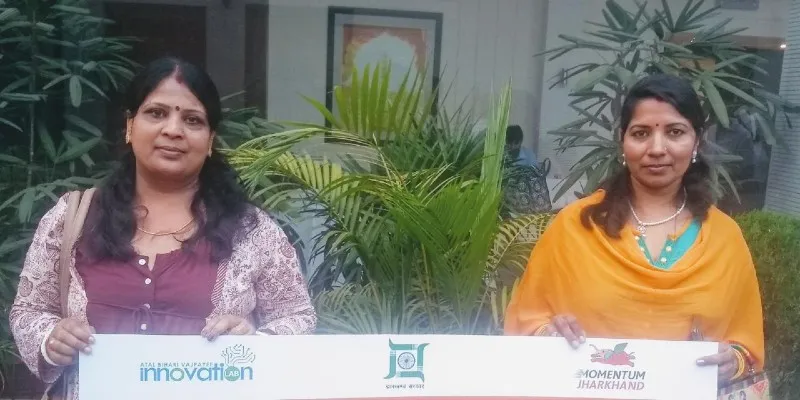Jharkhand elections: These startups have some pointers for the next state govt
In the run-up to the Jharkhand Assembly election results next week, YourStory spoke to some of the startups based in the state to know their stories, their experiences, and their expectations of the next government.
Ever since the Bharatiya Janata Party (BJP) won the electoral vote and Narendra Modi took oath as the 14th Prime Minister of India, the world of startups has received quite a bit of mainstream attention.

[File photo]
The states too have been trying to walk the line taken by the Centre towards developing the country’s startup ecosystem. One of them is Jharkhand. With the Jharkhand Assembly election results round the corner, startups have featured in the promises made by political parties vying for the next term.
The BJP, which is in power currently in Jharkhand, had its latest manifesto released by Union Minister and senior BJP leader Ravi Shankar Prasad in the last week of November. It promises a slew of measures to uplift startups in the state. Among other things, the manifesto commits a budget of Rs 500 crore for startups and the formation of a fund, ‘J-Super’. The saffron party has also promised to set up 48 incubators and 10 business centres by 2024.
YourStory spoke to some of the startups based in Jharkhand to know their stories, their experiences, and their expectations of the next government.
Jharkhand’s journey so far
According to a report by PHD Chamber of Commerce and Industry (PHDCCI), the state, which was created in November 2000, registered a Gross State Domestic Product (GSDP) of Rs 2,55,271 crore in FY18, compared to the Rs 1,74,724 crore clocked in FY13. For perspective, Maharashtra, which is reportedly the state with the highest GSDP in India, stands at about Rs 22.6 trillion. The size of Jharkhand’s economy is expected to surpass Rs 3 lakh crore by FY20, estimates the PHDCCI report. And, startups in the states want a pie of this, with ‘stronger’ government support.
In 2016, on the same pattern as the Centre's ‘Startup India’ campaign, the Jharkhand government had introduced the ‘StartUp Jharkhand’ initiative, earmarking Rs 50 crore to encourage entrepreneurs in different sectors. The Jharkhand Startup Policy 2016 aims to create a conducive and enabling ecosystem to facilitate the growth and scaling of at least a 1,000 direct startups and support 1,500 startups virtually, by 2021. These startups are selected by the State Evaluation Board (SEB) in phases.
The Jharkhand Startup Policy, formulated on the lines of the Startup India campaign, gives benefits such as full reimbursement for costs incurred by startups while filing domestic or international patents as well as reimbursements for rental, utility, marketing expenses, etc.
This year, the state’s first government-run coworking space was inaugurated at the Atal Bihari Vajpayee Innovation Lab (ABVIL) in Ranchi that enables selected startups to use the space free of cost. The startups also shared that there have been a number of hackathons, startups yatras, and meets organised in the state in a bid to develop the ecosystem.
Seen from a larger perspective, the Startup India campaign revolves around an action plan to promote bank financing for startup ventures towards the larger goals of boosting entrepreneurship and encouraging startups to contribute to job creation. The campaign was first announced by Prime Minister Narendra Modi in his 2015 Independence Day address.
In 2018, the Department of Industrial Policy and Promotion (DIPP) conducted a States’ Startup Ranking Exercise in which a total of 27 States and three Union Territories participated. The ranking found that Jharkhand is one of the ‘aspiring leaders’ when it comes to developing startups, with 116 Startup India-recognised nascent ventures then counted in the state. For perspective, NCR had 1,833 Startup India-recognised startups, Karnataka had 1,973, and Maharashtra had 2,587. As of 2018-end, there were a total of 8,724 Startup India-recognised startups in the country.
Here are the experiences of some of Jharkhand’s startups over the last couple of years in their own words and their expectations of the next elected state government.
Painfully slow and unpredictable
Pulkit Jain, entrepreneur and Founder of Ranchi-based Automaton Robotics and Automation Pvt Ltd, shares that his startup was among those selected in the first cohort by the Jharkhand SEB and that his venture has been connected with the Jharkhand Startup Policy since its inception. He says,
“The present team at ABVIL is very supportive in providing connections with the government as far as my requests were concerned. I have also been provided space at the makeshift campus of ABVIL incubator, free-of-charge, to set up my workshop-cum-office space, which has proved crucial to my business.”
Going on to share that the startup has been represented in various national platforms and received recognition in startup events on the back of the ABVIL team’s support, Pulkit adds that the fiscal and other benefits of the policy, however, have been painfully slow and unpredictable in coming.
Started in 2018 by Pulkit, Shuhbam Sagar Sahu, and Kailash Pati Dutta, Automaton Robotics makes hybrid rapid-prototyping machines that can cut, engrave, mill, and 3D-print objects, all on the same machine.
“Our focus is on the educational sector, startups, and MSMEs, and our aim is to provide feasible options for in-house development of high-quality rapid prototypes,” says Pulkit.
According to the entrepreneur, the implementation of the state’s startup policy is extremely slow which is bad for any business.
“For instance, the first tranche of funds for the first selected cohort was disbursed after nearly a year from the day of the first SEB meet. The subsequent cohorts are yet to receive funds. Also, the non-fiscal benefits have not yet been fully implemented. Any decision made against any request to the policy-makers is very slow,” he adds.
He says entrepreneurs’ expectations of the next government are setting and following of definite timelines for the implementation of initiatives under the state’s startup policy.
Pulkit also suggests appointing a dedicated executive team for startups in Jharkhand, headed by a CEO with experience in running incubators and who can provide valuable connects with VCs and funding agencies.
In his opinion, strengthening the team with representatives of non-government agencies and industries, who will act as advisors to the policy-making and implementation board, will help streamline a lot of procedures in the state with regard to startups.
Support without execution
Sagar Mishra is the Co-founder and Director of Dhanbad-based Trylika Technologies which runs 13TABS, a web search engine that categorises search results while keeping privacy at the core. He points out that though the government in Jharkhand is supportive towards startups, it lacks execution impetus and strength in a big way.
“The policies of the state government look good on paper, but, when it comes to execution, it is a total failure,” he says.
He adds that, when his company participated in the Startup India Jharkhand yatra in 2018, the experience was of an extremely unprofessional event. His primary hope from the next government, he says, is for it to go beyond engagement programmes.
“We expect that the government would organise startup-investors (angel and seed) meets in the future. Only then the startups here can make the most of the opportunities in the state. Until then, the policies and the events will remain a youth engagement programme and nothing else,” he states.
Started this year, 13TABS is also being incubated at NASSCOM 10000 Startups.
No accountability and incompetent

Raghav Garodia, and Prateek Maheshwari
Raghav Garodia, who has been running a nutraceutical startup in Jharkhand since 2016, expresses extreme disappointment with the startup ecosystem in Jharkhand.
Ranchi-based Venketesh Biosciences was started by Raghav, Prateek Maheshwari, and Akshay Chauhan in 2016. The enterprise’s solution removes smells from vegetarian omega 3 fatty acids, especially DHA (docosa hexanoic acid), making them conducive for adding in FMCG products.
“Our proprietary technique makes DHA soluble in water, masks the foul fishy smell, and increases the shelflife to 24 months, which allows us to incorporate it in consumer-friendly FMCG products,” explains Raghav.
The entrepreneur states that his experience of the startup system in Jharkhand has been really bad. “There is almost no accountability. The StartUp Jharkhand initiative seems more of a publicity stunt by the state government. There are no clear-cut directions on how to avail the benefits,” he says.
He adds that only a handful of startups have been able to avail the benefits and there is a huge backlog. According to him,
“The criteria for startups’ selection were really vague, and it did look like most of the selected teams were not even registered organisations at the start. There is no one accountable or answerable, and even the people appointed to help startups as part of Jharkhand Innovation Lab (JIL) are incompetent”.
Raghav adds that the startups have not yet received the assured reimbursements on a number of counts.
The entrepreneur’s expectation of the government that comes into power next — just ensuring the execution of the policies in place.
Slow process
Started in 2017 by women entrepreneurs Sunita Jaiswal and Sangeeta Jaiswal, Ranchi-based Servicall provides office and home maintenance services with the ease of making a service request on an android application and a website, mainly in Tier II and III cities.
According to Sunita, Jharkhand’s ecosystem for startups is still in a nascent phase and it has been difficult to introduce new ideas to the market, but things have been good so far for Survicall.
“The government has been supportive of the startups, but things have been really slow in terms of processing the startup policy,” she says.
Servicall was selected in the first phase by SEB in 2018 and received its first phase of the grant in 2019 for the platform development.
“We are currently incubated under ABVIL Incubation Centre, through which we are getting regular help and exposure to industry experts and mentors. But, in terms of processing the startup policy, the government is still lacking transparency. With no fixed tenures of grants disbursal for the selected startups, it is getting tough to meet our boosted expenses,” says Sunita.
She is hoping that the next government will give better attention to startups in the growing phase. “Fixed tenures of grant disbursal to startups and a transparent policy for the startups incubated under the government should fix the issue,” adds Sunita.

Sunita Jaiswal and Sangeeta Jaiswal, co-founders of Ranchi-based Servicall
Twenty-year-old Vivek Kumar echoes the same concerns. He has been running a waste management company, Recyclingbazar, since 2017 in Bihar and Jharkhand, and the venture is one of the startups recognised by StartUp Jharkhand.
In Vivek’s experience, the state’s startup milieu has proved good so far and there is a community to uplift the startups. However, he too highlights the painpoint of the slow processes, including for funding, in the state.
(Edited by Athirupa Geetha Manichandar)








